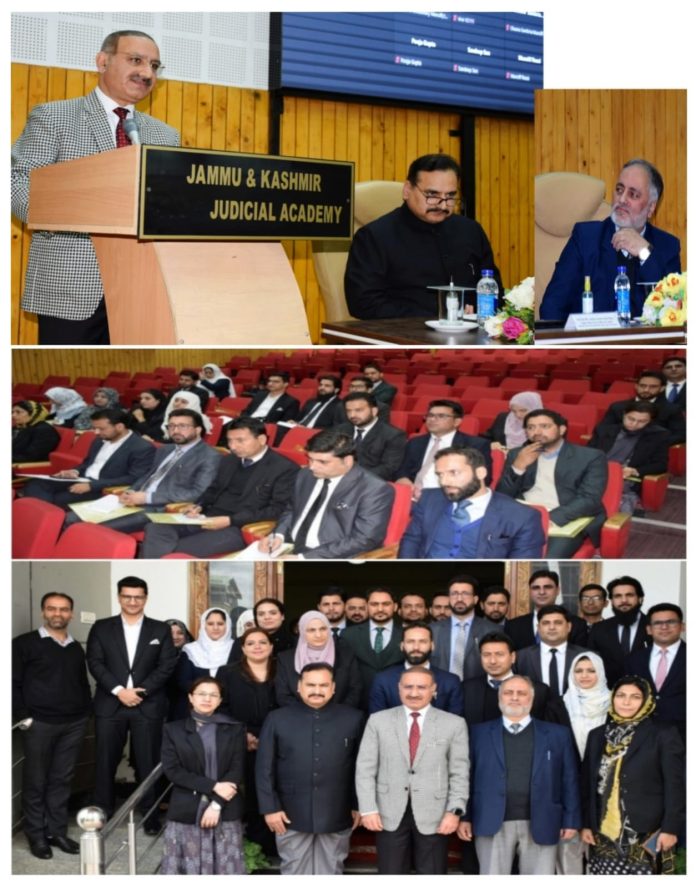SRINAGAR: The J&K Judicial Academy today organized a one-day Refresher programme on “Remand & Bail Jurisprudence – Basic Principles, Parameters and Conditions with Special Provisions on Bail under General and Special Laws, Reasonable Exercise of Judicial Discretion and Order Writing” for the participant Judicial Officers of Kashmir province at Judicial Academy Srinagar and for the participating Judicial Officers from Jammu province and UT of Ladakh through virtual mode.
The programme was organized by under the patronage of Justice N. Kotiswar Singh, Chief Justice, High Court of Jammu & Kashmir and Ladakh, (Patron-in-Chief, J&K Judicial Academy) and guidance of Justice Sindhu Sharma, Chairperson, Governing Committee for J&K Judicial Academy and Justice Vinod Chatterji Koul, Justice Javed Iqbal Wani, and Justice Wasim Sadiq Nargal, Members of Governing Committee,
The training programme was inaugurated by Justice Javed Iqbal Wani, Judge, High Court of J&K and Ladakh and Member, Governing Committee for J&K Judicial Academy in presence of R.A. Jan, Sr. Advocate High Court of J&K and Ladakh and M. Y. Akhoon, Former District & Sessions Judge, who were the resource persons in the programme.
The training programme was conducted by Y. P. Bourney, Director, J&K Judicial Academy.
Justice Javed Iqbal Wani, in his inaugural address and by quoting Justice V. R. Krishna Iyer underlined the basic principle “Bail not Jail” followed by all the courts including the Apex Court till date in Gudikanti Narasimhulu versus State (1978) 1 SCC 240.
Quoting from the judgment that the issue of bail is one of liberty, justice, public safety and burden of the public treasury, all of which insist that a developed jurisprudence of bail is integral to a socially sensitized judicial process, he added. After all, personal liberty of an Accused or convict is fundamental, suffering lawful eclipse only in terms of procedure established by law.”
The basic principle or the bottom line on which the concept of bail or bail application has to be addressed by Magistrate, has to be in the context of the society because crime is always against the society and therefore, society has a vital interest in the grant or refusal of a bail irrespective of what is the nature of crime, what is gravity of a crime and what is punishment for that offence carries.
Y. P. Bourney, Director, J&K Judicial Academy gave an overview of the programme. He highlighted that even in cases involving non-bailable offences, bail is the rule and jail is an exception unless there is a statutory prohibition under general or special laws or detention in custody is absolutely necessary to prevent the repetition, tempering with the evidence of intimidation to the witnesses etc.
Therefore, attempts have been made by the constitutional courts from time to time to streamline and rationalise the exercise of discretion by the courts by laying down suitable guidelines so as to minimise arbitrariness.
Later, judgments have noted the duty of the magistracy to ensure compliance with these safeguards. Time and again, safeguards that the police and magistrates must observe have been prescribed, as this protection is not just the essence of liberty but is also needed to prevent the humiliation and stigma caused by an arrest. It would thus be incumbent on the police to exercise great circumspection before resorting to the drastic power of arrest.
In the first technical session, R. A. Jan Sr. Advocate guided the participants about the relevant provisions of Remand & Bail Jurisprudence Basic Principles, Parameters and Conditions in light of the judicial pronouncements.
In the second technical session, the resource person M. Y. Akhoon deliberated on the topics of Special Provisions on Bail under General and Special Laws, Reasonable Exercise of Judicial Discretion and Order Writing.
Later, during the interactive part of both sessions, the participating officers highlighted their queries and discussed various aspects of the subject topic with the resource persons which were answered satisfactorily by them.


